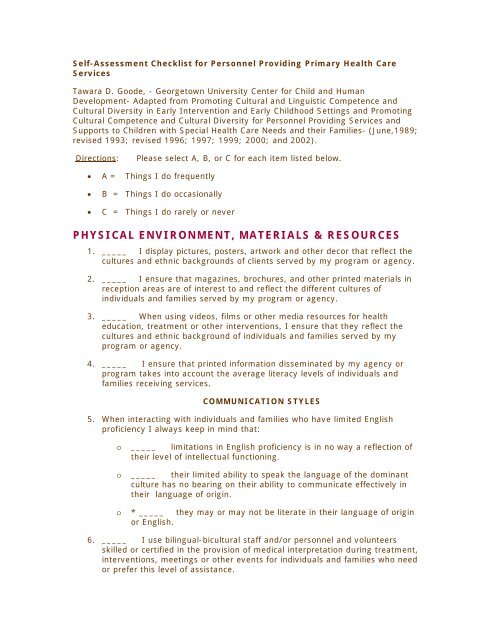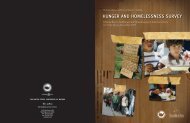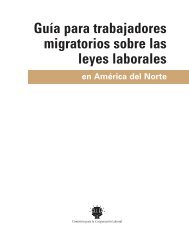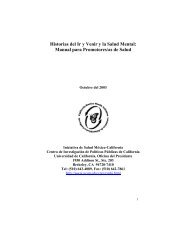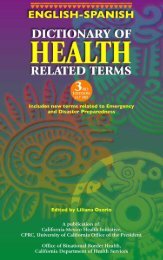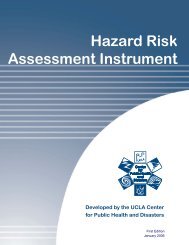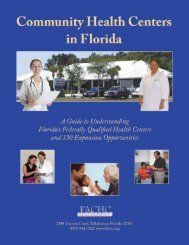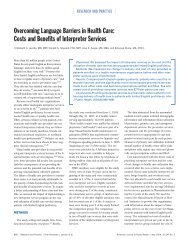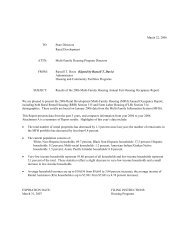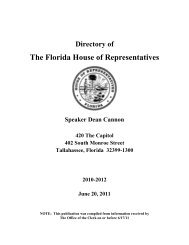Self-Assessment Checklist for Personnel Providing Primary Health ...
Self-Assessment Checklist for Personnel Providing Primary Health ...
Self-Assessment Checklist for Personnel Providing Primary Health ...
Create successful ePaper yourself
Turn your PDF publications into a flip-book with our unique Google optimized e-Paper software.
<strong>Self</strong>-<strong>Assessment</strong> <strong>Checklist</strong> <strong>for</strong> <strong>Personnel</strong> <strong>Providing</strong> <strong>Primary</strong> <strong>Health</strong> Care<br />
Services<br />
Tawara D. Goode, - Georgetown University Center <strong>for</strong> Child and Human<br />
Development- Adapted from Promoting Cultural and Linguistic Competence and<br />
Cultural Diversity in Early Intervention and Early Childhood Settings and Promoting<br />
Cultural Competence and Cultural Diversity <strong>for</strong> <strong>Personnel</strong> <strong>Providing</strong> Services and<br />
Supports to Children with Special <strong>Health</strong> Care Needs and their Families- (June,1989;<br />
revised 1993; revised 1996; 1997; 1999; 2000; and 2002).<br />
Directions:<br />
Please select A, B, or C <strong>for</strong> each item listed below.<br />
• A = Things I do frequently<br />
• B = Things I do occasionally<br />
• C = Things I do rarely or never<br />
PHYSICAL ENVIRONMENT, MATERIALS & RESOURCES<br />
1. _____ I display pictures, posters, artwork and other decor that reflect the<br />
cultures and ethnic backgrounds of clients served by my program or agency.<br />
2. _____ I ensure that magazines, brochures, and other printed materials in<br />
reception areas are of interest to and reflect the different cultures of<br />
individuals and families served by my program or agency.<br />
3. _____ When using videos, films or other media resources <strong>for</strong> health<br />
education, treatment or other interventions, I ensure that they reflect the<br />
cultures and ethnic background of individuals and families served by my<br />
program or agency.<br />
4. _____ I ensure that printed in<strong>for</strong>mation disseminated by my agency or<br />
program takes into account the average literacy levels of individuals and<br />
families receiving services.<br />
COMMUNICATION STYLES<br />
5. When interacting with individuals and families who have limited English<br />
proficiency I always keep in mind that:<br />
o _____ limitations in English proficiency is in no way a reflection of<br />
their level of intellectual functioning.<br />
o _____ their limited ability to speak the language of the dominant<br />
culture has no bearing on their ability to communicate effectively in<br />
their language of origin.<br />
o * _____ they may or may not be literate in their language of origin<br />
or English.<br />
6. _____ I use bilingual-bicultural staff and/or personnel and volunteers<br />
skilled or certified in the provision of medical interpretation during treatment,<br />
interventions, meetings or other events <strong>for</strong> individuals and families who need<br />
or prefer this level of assistance.
7. _____ For individuals and families who speak languages or dialects other<br />
than English, I attempt to learn and use key words in their language so that I<br />
am better able to communicate with them during assessment, treatment or<br />
other interventions.<br />
8. _____ I attempt to determine any familial colloquialisms used by<br />
individuals or families that may impact on assessment, treatment or other<br />
interventions.<br />
9. _____ When possible, I ensure that all notices and communiqués to<br />
individuals and families are written in their language of origin.<br />
10. _____ I understand that it may be necessary to use alternatives to written<br />
communications <strong>for</strong> some individuals and families, as word of mouth may be<br />
a preferred method of receiving in<strong>for</strong>mation.<br />
VALUES & ATTITUDES<br />
11. _____ I avoid imposing values which may conflict or be inconsistent with<br />
those of cultures or ethnic groups other than my own.<br />
12. _____ I screen books, movies, and other media resources <strong>for</strong> negative<br />
cultural, ethnic, or racial stereotypes be<strong>for</strong>e sharing them with individuals and<br />
families served by my program or agency.<br />
13. _____ I intervene in an appropriate manner when I observe other staff or<br />
clients within my program or agency engaging in behaviors which show<br />
cultural insensitivity, racial biases and prejudice.<br />
14. _____ I recognize and accept that individuals from culturally diverse<br />
backgrounds may desire varying degrees of acculturation into the dominant<br />
culture.<br />
15. _____ I understand and accept that family is defined differently by<br />
different cultures (e.g. extended family members, fictive kin, godparents).<br />
16. _____ I accept and respect that male-female roles may vary significantly<br />
among different cultures and ethic groups (e.g. who makes major decisions<br />
<strong>for</strong> the family).<br />
17. _____ I understand that age and life cycle factors must be considered in<br />
interactions with individuals and families ( e.g. high value placed on the<br />
decision of elders, the role of eldest male or female in families, or roles and<br />
expectation of children within the family).<br />
18. _____ Even though my professional or moral viewpoints may differ, I<br />
accept individuals and families as the ultimate decision makers <strong>for</strong> services<br />
and supports impacting their lives.<br />
19. _____ I recognize that the meaning or value of medical treatment and<br />
health education may vary greatly among cultures.<br />
20. _____ I accept that religion and other beliefs may influence how<br />
individuals and families respond to illnesses, disease, and death.
21. _____ I understand that the perception of health, wellness and preventive<br />
health services have different meanings to different cultural or ethnic groups.<br />
22. _____ I recognize and accept that folk and religious beliefs may influence<br />
an individual’s or family’s reaction and approach to a child born with a<br />
disability, or later diagnosed with a disability, genetic disorder, or special<br />
health care needs.<br />
23. _____ I understand that grief and bereavement are influenced by culture.<br />
24. _____ I seek in<strong>for</strong>mation from individuals, families or other key community<br />
in<strong>for</strong>mants that will assist in service adaptation to respond to the needs and<br />
preferences of culturally and ethnically diverse groups served by my program<br />
or agency.<br />
25. _____ Be<strong>for</strong>e visiting or providing services in the home setting, I seek<br />
in<strong>for</strong>mation on acceptable behaviors, courtesies, customs, and expectations<br />
that are unique to the culturally and ethnically diverse groups served by my<br />
program or agency.<br />
26. _____ I keep abreast of the major health concerns and issues <strong>for</strong><br />
ethnically and racially diverse client populations residing in the geographic<br />
locale served by my program or agency.<br />
27. _____ I am aware of the socio-economic and environmental risk factors<br />
that contribute to health disparities and/or major health problems of<br />
culturally, ethnically and racially diverse populations served by my program or<br />
agency.<br />
28. _____ I am well versed in the most current and proven practices,<br />
treatments and interventions <strong>for</strong> major health problems among ethnically and<br />
racially diverse groups within the geographic locale served by my agency or<br />
program.<br />
29. _____ I avail myself to professional development and training to enhance<br />
my knowledge and skills in the provision of services and supports to<br />
culturally, ethnically, racially and linguistically diverse groups.<br />
30. _____ I advocate <strong>for</strong> the review of my program's or agency's mission<br />
statement, goals, policies, and procedures to ensure that they incorporate<br />
principles and practices that promote cultural and linguistic competence.<br />
How to use this checklist<br />
This checklist is intended to heighten the awareness and sensitivity of personnel to<br />
the importance of cultural and linguistic cultural competence in health and human<br />
service settings. It provides concrete examples of the kinds of beliefs, attitudes,<br />
values and practices which foster cultural and linguistic competence at the individual<br />
or practitioner level. There is no answer key with correct responses. However, if you<br />
frequently responded "C", you may not necessarily demonstrate beliefs, attitudes,<br />
values and practices that promote cultural and linguistic competence within health<br />
care delivery programs.


